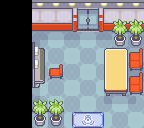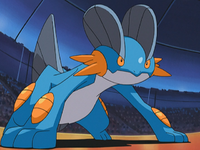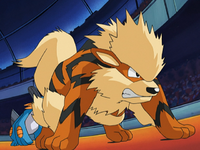Battle Dome
- If you were looking for the 2005 board game by Hasbro and Milton Bradley, see Pokémon Battle Dome.
| Battle Dome バトルドーム Battle Dome | |||||||||||||||||||||

| |||||||||||||||||||||
| "Your path to the invincible superstar!" | |||||||||||||||||||||
| |||||||||||||||||||||
The Battle Dome (Japanese: バトルドーム Battle Dome) is a facility located within the Hoenn Battle Frontier in Pokémon Emerald.
Challenges
Each challenge at the Battle Dome is a tournament between 16 Trainers.
Before each battle, the player can find out about their opponent, such as the Pokémon they use, their battle style, and how they train. Then, both Trainers choose two Pokémon from their three-Pokémon party to use in battle. Competitors can find out who was eliminated in each round by looking at the tournament bracket.
Seeding
The tournament bracket is organized as follows:
- Left Bracket: 1 vs 9, 13 vs 5, 8 vs 16, 12 vs 4
- Right Bracket: 3 vs 11, 15 vs 7, 6 vs 14, 10 vs 2
Seedings are determined by their ranking: the sum of the combined base stat totals of all Pokémon, plus 1/20 of the product of the number of different types represented by the Pokémon and the highest level among the Pokémon. If two Trainers tie in ranking, the higher internal Trainer number will win the tiebreaker; the player will always win the tiebreaker against any CPU Trainer, while Dome Ace Tucker will win any tiebreaker against other CPU Trainers. In the event of a tie battle, the higher seed advances and the lower seed is eliminated.
Opponent Trainer card
Before each battle, the player is shown a Trainer card with some information about their opponent. It includes their Trainer class and name, Trainer sprite, the Pokémon in their party, and three lines describing the Trainer.
The first line of the description is based on the Trainer's seed in the tournament tree. Trainers with higher seeds are described as having more potential. Dome Ace Tucker has a unique potential description.
The second line of the description is based on the Trainer's Pokémon's moves. Every move in the game has a series of flags for this check, and the moves across the Trainer's party are aggregated to determine what this line should be.
The third line of the description is based on the Trainer's Pokémon's stats—specifically, their effort values (EVs) and nature.
Move description
The game's description of Trainer style is determined by looking at flags assigned to the moves, which are as follows:[1]
After checking for the move flags, the game reads the following list from top to bottom.
| Quote | Requirement |
|---|---|
| Willing to risk total disaster at times. | At least one risky move |
| Skilled at enduring long battles. | At least two healing moves, one status moves and two defensive moves |
| Varies tactics to suit the opponent. | At least one of combo move, stat raising, stat lowering, healing, status and defensive move each |
| Has a tough winning pattern. | At least three combo moves |
| Occasionally uses a very rare move. | At least two rare moves |
| Uses startling and disruptive moves. | At least one rare move |
| Constantly watches HP in battle. | At least three healing moves |
| Good at storing then loosing power. | At least one stat raising and healing move each |
| Skilled at enfeebling foes. | At least one stat lowering and status move each |
| Prefers tactics that rely on luck. | At least two lucky moves |
| Attacks with a regal atmosphere. | At least one of stat raising, healing, defensive, popular and strong move each |
| Attacks with powerful, low-PP moves. | At least three low PP moves. |
| Skilled at enfeebling, then attacking. | At least one stat raising and one status move each |
| Battles while enduring all attacks. | At least two of healing and defensive moves each |
| Skilled at upsetting foes emotionally. | At least two status moves |
| Uses strong and straightforward moves. | At least three of strong and accurate moves each |
| Aggressively uses strong moves. | At least four strong moves |
| Battles while cleverly dodging attacks. | At least three defensive moves |
| Skilled at using upsetting attacks. | At least two of stat lowering and status moves each |
| Uses many popular moves. | At least three of popular and powerful moves each |
| Has moves for powerful combinations. | At least two combo moves |
| Uses high-probability attacks. | At least one healing move and three accurate moves |
| Aggressively uses spectacular moves. | At least four powerful moves |
| Emphasizes offense over defense. | At least seven damaging moves |
| Emphasizes defense over offense. | At least four defensive moves |
| Attacks quickly with strong moves. | At least two popular moves and four strong moves |
| Often uses moves with added effects. | At least four moves with added effects |
| Uses a well-balanced mix of moves. | None of the above |
The two styles in gray will never appear in-game, as a style above them will always meet the requirement first.
Stat description
The stat description is determined by the effort values of the Trainer's Pokémon. A stat is considered to be emphasized if it makes up at least 30% of the team's total EVs, and neglected if it makes up less than 1% of the team's total EVs in that stat among the entered Pokémon. Natures are taken into account for this calculation, such that EVs on a Pokémon with a beneficial Nature are worth 10% more, while EVs on a Pokémon with a hindering Nature are worth 10% less.
If there are any emphasized stats, they are shown (if there are three emphasized stats, only the two that make up the most of the team's EV are shown). Otherwise, if there are any neglected stats, they are shown (if there are more than two, only two are shown—stats with hindering Natures among the team Pokémon are preferred for the listing). Otherwise, the Trainer is said to "raise Pokémon in a well-balanced way."
CPU battles
Note that the game does not simulate battles between two CPU Trainers. Instead, the outcome between two CPU Trainers is broken down as follows: each Trainer is scored based upon the sum of the following:
- The type affinity of damaging attacks: each attack dealing damage on the team is compared against each Pokémon on the opposing team. 4 points are awarded if the attack is normally effective, 12 if super effective, and 20 if 4× super effective. No points are awarded if the attack is resisted. 8 points are deducted if the attack is 4× resisted, and 16 points are deducted if the attack is ineffective. For the purposes of calculating this, Ground-type attacks are considered to be neutral against Pokémon with Levitate. Against Pokémon with Wonder Guard, type matchups that are not super effective do not award nor deduct points.
- The sum of the base stats of all Pokémon, divided by 10
- The seeding of the Trainer, minus 1
- A random value from 0 to 31
The Trainer with the higher score advances; if this is a tie, then the higher-seeded Trainer advances. During tournaments in which he may be challenged by the player, Tucker always appears as the #2 seeded contestant, and will always win his battles against CPU opponents.
CPU Pokémon selection
To determine the Pokémon sent out by a CPU Trainer against the player, each of the CPU Trainer's three Pokémon is given a score. There are two scoring methods, which are chosen at random: the offensive method and defensive method. Both methods compare the type affinity of the Pokémon's damaging attacks against each of the three Pokémon on the player's team. In the offensive method, 2 points are awarded if the attack is normally effective, 4 if super effective, and 8 if 4× super effective. In the defensive method, 2 points are awarded if the attack is resisted, 4 if 4× resisted, and 8 if ineffective. 2 points are deducted if super effective, and 4 are deducted if 4× super effective. No points are awarded or deducted in any other scenario. For the purposes of this calculation, type matchups that are not super effective against Pokémon with Wonder Guard are ignored (no points are awarded or deducted), and Ground-type attacks are considered to be neutral against Pokémon with Levitate.
If all three Pokémon tie in one method, the other method is used. If all three Pokémon tie in the second method, then two Pokémon and the order they appear are chosen at random. Otherwise, the two highest-scoring Pokémon are chosen (if there is a tie for the second selection, the second selection of Pokémon is chosen at random). There is a 40% chance that the CPU Trainer will lead off with the higher-scoring Pokémon, and a 60% chance of leading off with the lower-scoring Pokémon.
Battle Points
| BP per round | 1 | 2 | 3 | 4 | 5 | 6 | 7 | 8 | 9 | 10 | 11 | 12 | 13 | 14 | 15 | 16 | 17 | 18 | 19 | 20 | 21 | 22 | 23 | 24 | 25 | 26 | 27 | 28 | 29 | 30 |
|---|---|---|---|---|---|---|---|---|---|---|---|---|---|---|---|---|---|---|---|---|---|---|---|---|---|---|---|---|---|---|
| Any level mode | 1 | 1 | 2 | 2 | 13 | 3 | 4 | 4 | 5 | 15 | 6 | 6 | 7 | 7 | 18 | 8 | 9 | 9 | 10 | 20 | 11 | 11 | 12 | 12 | 23 | 13 | 14 | 14 | 15 | 25 |
Dome Ace
After the player has won five and ten championships, Tucker will challenge them. On his defeat, he awards the Tactics Symbol.
Tucker uses two of these Pokémon when battling the player.
Silver Symbol challenge
|
|||||||||||||||||||||||||||||||||||||||||||||||||||||||||||||||||||
| |||||||||||||||||||||||||||||||||||||||||||||||||||||||||||||||||||
Gold Symbol challenge
|
|||||||||||||||||||||||||||||||||||||||||||||||||||||||||||||||||||
| |||||||||||||||||||||||||||||||||||||||||||||||||||||||||||||||||||
Layout

|

|

|
| Inside the Battle Dome | Trainers can view info on their opponents | Before battle in the Battle Dome |
In animation


Pokémon the Series
Pokémon the Series: Ruby and Sapphire
The Battle Dome appeared in Tactics Theatrics!!. In Pokémon the Series, it is located south of Lavender Town, possibly on Route 12, and was the third Battle Frontier facility challenged by Ash. The group discovered its location in Wheel of Frontier, following Ash's victory against Greta at the Battle Arena. The facility is run by Tucker and the battles are refereed by Victor.
In the Battle Dome, challengers have to defeat the Dome Ace in a Double Battle. They are given the possibility of swapping their party Pokémon with ones they have in storage after the Frontier Brain has revealed his Pokémon. After a tough match, Ash managed to defeat Tucker using his Corphish and Swellow. This victory gave Ash the Tactics Symbol, his third Frontier Symbol overall.
Pokémon used in the Battle Dome
The following is a list of Pokémon used in the Battle Dome:
| Debut | Tactics Theatrics!! |
|---|---|
| Voice actors | |
| Japanese | Kōichi Sakaguchi |
| English | Bill Rogers |
Swampert was one of the two Pokémon that battled against Ash's Corphish and Ash's Swellow. Swampert and Arcanine seemed like a perfect combination, taking advantage of Arcanine's speed and its defense as stated by Brock in the episode. In the Double Battle, Swampert's main target was Corphish. Even though it looked bad for Ash, after Tucker used the Fusion of Fire and Water, Corphish and Swellow gained their fighting spirit and came back to win the match for Ash. Swampert was defeated by an Aerial Ace from Swellow.
Swampert's known moves are Protect, Mud Shot, Dynamic Punch, Water Gun, and Water Pulse.
| Debut | Tactics Theatrics!! |
|---|---|
| Voice actors | |
| Japanese | Chie Satō |
| English | Chie Satō |
The other Pokémon Tucker used was Arcanine. Swampert and Arcanine were a perfect combination, taking advantage of Arcanine's speed and Swampert's defense. Even though it looked bad for Ash, after Tucker's Fusion of Fire and Water, Corphish and Swellow gained their fighting spirit and with the help of some strategy of Ash's, they were able to win the match. Arcanine was defeated by a Crabhammer from Ash's Corphish.
Arcanine's known moves are Extreme Speed, Flamethrower, Fire Blast, and Aerial Ace.
In the manga
Pokémon Adventures

In Pokémon Adventures, the Trainer who wins the Battle Dome challenge always earns the Tactics Symbol, regardless of whether Tucker makes it to the finals or not.
Emerald arc
The Battle Dome first appeared in Verily Vanquishing Vileplume I, where Emerald challenged it as his fifth Battle Frontier facility during the Battle Frontier's seven-day opening ceremony. Due to the tournament-style structure of the challenge, Trainers were shipped from the Hoenn mainland over to the Battle Frontier to participate in it to avoid endless battles between computer-controlled virtual Trainers. Amongst the participating Trainers were Ruby and Sapphire, who tried to make friends with Emerald, much to his annoyance.
During the semifinal battle between Ruby and Emerald, Ruby revealed that Emerald's Sceptile was the very same Treecko that Emerald had once been supposed to receive from Professor Birch. As Emerald defeated Ruby and Sapphire was defeated by Tucker, Emerald and Tucker were set to face each other in the finals. However, Emerald abruptly requested the permission to swap his party Pokémon with ones from Crystal. Although this was against the rules, Tucker allowed it. However, Emerald's borrowed Alakazam and Metagross both wound up getting defeated by Tucker's Charizard, resulting in Emerald's first loss at the Battle Frontier.
The final battle was observed by most of the other Frontier Brains. As soon as it had ended and Emerald had headed off to challenge the Battle Palace, Tucker noticed Guile Hideout outside the window, and Noland was informed that Jirachi had been sighted on the Battle Dome rooftop. The Frontier Brains rushed to the rooftop, but arrived too late to stop Guile from capturing Jirachi for his evil schemes.
In Epilogue, after Emerald had managed to obtain all six other Symbols, he realized that he only had one day left to earn the Tactics Symbol. While the Battle Dome was still operable, despite the damage that Guile Hideout had caused to the Battle Frontier, the challenge required a group of Trainers to form a tournament. To everyone's surprise, Red suggested a tournament between the ten Pokédex holders, which Scott happily accepted. At the end of the chapter, Emerald was shown to have earned the Tactics Symbol, indicating that he had won the tournament and thus successfully completed his seven-day Battle Frontier challenge.
Pokémon Battle Frontier

The Battle Dome appeared in Introducing the Frontier Brains!. After learning about Frontier Brains, Enta decided to challenge each of them, starting at the Battle Dome. After achieving a long-enough win streak, Enta came face to face with Tucker, who challenged him to a Double Battle. After a tough match, Enta was able to defeat Tucker with his Vulpix and Feebas. At first, Tucker was unwilling to admit that Enta could've beaten him with a Pokémon as ugly as Feebas, but he changed his mind when Feebas evolved into Milotic.
Trivia
- Due to a programming bug, the IVs of Pokémon belonging to NPC Trainers in the Battle Dome do not increase based on the player's win streak. As a result, all Pokémon fought in this facility will have 3 IVs in each stat.
- This excludes Tucker's Pokémon, who have 20 IVs in each stat for the Silver Symbol challenge, and 31 IVs in each stat for the Gold Symbol challenge.
In other languages
| |||||||||||||||||||||||||||||||||||||||||||||||||
References
Related articles
| Hoenn | ||||||||
|---|---|---|---|---|---|---|---|---|
|
| ||||||||
|

|
This article is part of Project Locations, a Bulbapedia project that aims to write comprehensive articles on every location in the Pokémon world. |










